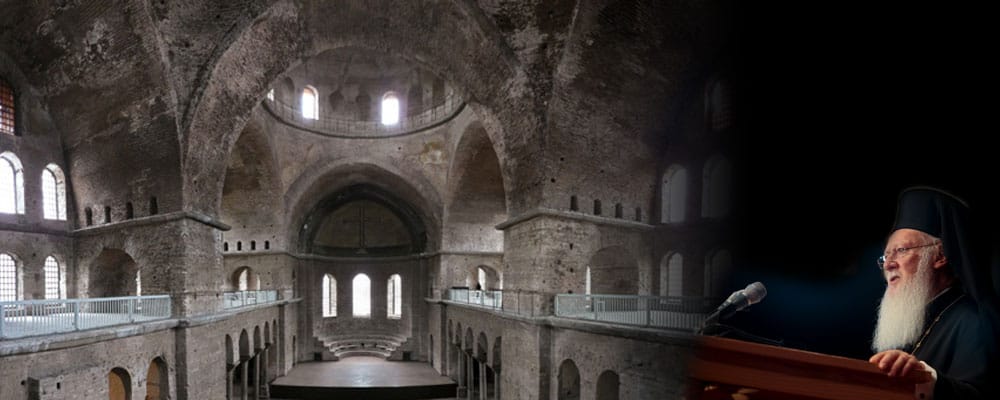
Why the “Holy and Great Synod” of the Orthodox Church should not convene
I want to express my grave concern and my great fear that the “Holy and Great Synod” of the Orthodox Church that has been in preparation over the past 50 years (called by the Ecumenical Patriarch Athenagoras and supported by his successors, especially the current Patriarch Bartholomew) will bring great harm to the faithful Orthodox people. I will explain my reasons why it would be better if this Pan-Orthodox Council did not convene.
Last year (March 6-9, 2014), at a meeting of the heads of the local Orthodox Churches called by Patriarch Bartholomew in Istanbul, it was decided to convene this Pan-Orthodox Council in 2016, which at a later meeting it was set for the month of June. A great veil of secrecy has been covering the meetings and deliberations of the committees that are preparing this super Synod. The bishops themselves have not been made aware of its agenda and progress.
Under the rules recently made known, this is a very peculiar and unique Synod. The voices of the few who have dissenting views will be silenced. Each participating local Church will have a single vote, although it will be represented by 24 bishops. Unfortunately, the climate within the hierarchal circles is impregnated with the ecumenist and synchretist spirit of the age. Thus the unanimous approval by the ecumenist bishops that constitute the majority of the hierarchy is already secured.
"... the Ecumenists will attempt to validate the modernism they are trying to promote within the Church … They want it to be a synod that will tear down the decisions of the previous Ecumenical Synods.”
For this reason, knowing the composition of this synod, Fr. Charalambos Vasilopoulos of blessed memory in his book Ecumenism Unmasked (1995) called it a conciliabulum, a false council, because, as he explained, “the Ecumenists will attempt to validate the modernism they are trying to promote within the Church … They want it to be a synod that will tear down the decisions of the previous Ecumenical Synods,” instead of building upon them.
For the same reason, the God-bearing Father of the Church, St. Justin Popović, in a Memorandum submitted to the Holy Synod of the Hierarchy of the Orthodox Serbian Church in 1971, stated that the conditions at this time are the most inappropriate in the history of our Church for the convocation of a synod:
“It would be in the best interests of the Orthodox Church if such Ecumenical Synod were not convened, or at least no one participated in it.”
The Saint explained:
“In these apocalyptic times it is difficult, or rather impossible, for many hierarchs of the local Orthodox Churches, to confess correctly in this Ecumenical Synod, which eventually is going to be convened, the Orthodox dogmas and the correct truths, according to the teachings of the holy Fathers, because of human weaknesses.”
By “human weaknesses” he meant the fear of the Ecumenical Patriarch and the pressures he exerts over the bishops.
That great hierarch of the Church, Augustinos of Florina, was not weak, so despite his advanced age he openly expressed the reason for his objection to the convocation of this synod. If Ecumenical Synods were convened, he said, it was to address heresy. Indeed he saw an urgent reason to convene a new Ecumenical Synod if only in order to condemn contemporary heresies, particularly the heresy of Ecumenism, called “the heresy of heresies.” But he realized that it would not be possible to condemn this arch-heresy, when the overwhelming majority of our hierarchs either openly promote it or tacitly accept it.
But why isn’t this synod called Ecumenical? If bishops from all the Orthodox local churches are called to participate what prevents it from being Ecumenical? It is because, in the view of the Ecumenical patriarch who calls it, the Roman Catholic Church (the “sister church”) is not a participant. This reveals the heretical view the ecumenists have of the Church, i.e. that the Orthodox Church is not the Church founded by Christ, but only a fragment of a divided Church. I think this is the reason why they are not calling this synod Ecumenical.
I am afraid that my fear will be realized, and that this conciliabulum, or better latrocinium and pseudo-synod, will lead astray many Orthodox people, giving rise to a new schism. I trust that most faithful Orthodox people will reject it, as they did with the Latrocinium of Ephesos (449) and the pseudo-council of Ferrara (1438-45). For this reason, it is my fervent prayer that this synod will not convene.
Finally, I express a greater fear, that the planned “Great Synod” will spread the infectious disease of ecumenism to every corner of Orthodoxy. It is my fervent hope and prayer that a figure will emerge, like those of St. Athanasios the Great against Arianism, St. Maximos the Confessor against Monothelitism and St. Mark of Ephesos against Uniatism, to fight this scourge of the true Faith.